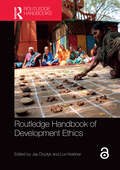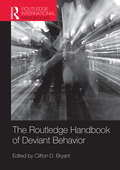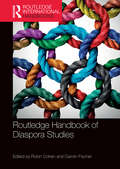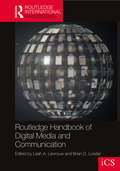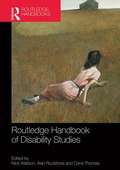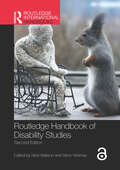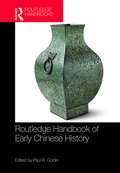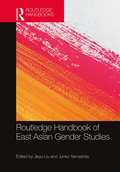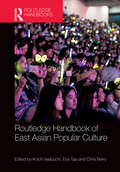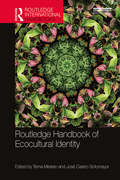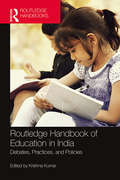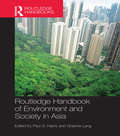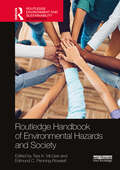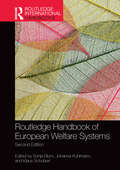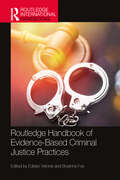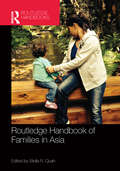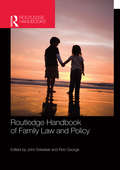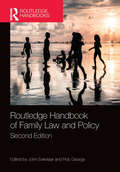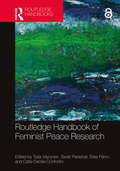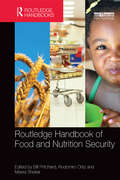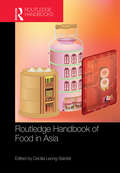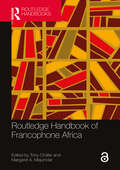- Table View
- List View
Routledge Handbook of Development Ethics
by Lori Keleher Jay DrydykThe Routledge Handbook of Development Ethics provides readers with insight into the central questions of development ethics, the main approaches to answering them, and areas for future research. Over the past seventy years, it has been argued and increasingly accepted that worthwhile development cannot be reduced to economic growth. Rather, a number of other goals must be realised: • Enhancement of people's well-being • Equitable sharing in benefits of development • Empowerment to participate freely in development • Environmental sustainability • Promotion of human rights • Promotion of cultural freedom, consistent with human rights • Responsible conduct, including integrity over corruption Agreement that these are essential goals has also been accompanied by disagreements about how to conceptualize or apply them in different cases or contexts. Using these seven goals as an organizing principle, this handbook presents different approaches to achieving each one, drawing on academic literature, policy documents and practitioner experience. This international and multi-disciplinary handbook will be of great interest to development policy makers and program workers, students and scholars in development studies, public policy, international studies, applied ethics and other related disciplines.
Routledge Handbook of Deviant Behavior (Routledge International Handbooks)
by Clifton D. BryantThe Handbook of Deviant Behavior presents a comprehensive, integrative, and accessible overview of the contemporary body of knowledge in the field of social deviance in the twenty-first century. This book addresses the full range of scholarly concerns within this area – including theoretical, methodological, and substantive issues – in over seventy original entries, written by an international mix of recognized scholars. Each of these essays provides insight not only into the historical and sociological evolution of the topic addressed, but also highlights associated notable thinkers, research findings, and key published works for further reference. As a whole, this Handbook undertakes an in depth evaluation of the contemporary state of knowledge within the area of social deviance, and beyond this considers future directions and concerns that will engage scholars in the decades ahead. The inclusion of comparative and cross-cultural examples and discussions, relevant case studies and other pedagogical features make this book an invaluable learning tool for undergraduate and post graduate students in disciplines such as criminology, mental health studies, criminal theory, and contemporary sociology.
Routledge Handbook of Diaspora Studies (Routledge International Handbooks)
by Robin CohenThe word ‘diaspora’ has leapt from its previously confined use – mainly concerned with the dispersion of Jews, Greeks, Armenians and Africans away from their natal homelands – to cover the cases of many other ethnic groups, nationalities and religions. But this ‘horizontal’ scattering of the word to cover the mobility of many groups to many destinations, has been paralleled also by ‘vertical’ leaps, with the word diaspora being deployed to cover more and more phenomena and serve more and more objectives of different actors. With sections on ‘debating the concept’, ‘complexity’, ‘home and home-making’, ‘connections’ and ‘critiques’, the Routledge Handbook of Diaspora Studies is likely to remain an authoritative reference for some time. Each contribution includes a targeted list of references for further reading. The editors have carefully blended established scholars of diaspora with younger scholars looking at how diasporas are constructed ‘from below’. The adoption of a variety of conceptual perspectives allows for generalization, contrasts and comparisons between cases. In this exciting and authoritative collection over 40 scholars from many countries have explored the evolving use of the concept of diaspora, its possibilities as well as its limitations. This Handbook will be indispensable for students undertaking essays, debates and dissertations in the field.
Routledge Handbook of Digital Media and Communication (Routledge International Handbooks)
by Leah A. Lievrouw Brian D. LoaderWhat are we to make of our digital social lives and the forces that shape it? Should we feel fortunate to experience such networked connectivity? Are we privileged to have access to unimaginable amounts of information? Is it easier to work in a digital global economy? Or is our privacy and freedom under threat from digital surveillance? Our security and welfare being put at risk? Our politics undermined by hidden algorithms and misinformation? Written by a distinguished group of leading scholars from around the world, the Routledge Handbook of Digital Media and Communication provides a comprehensive, unique, and multidisciplinary exploration of this rapidly growing and vibrant field of study. The Handbook adopts a three-part structural framework for understanding the sociocultural impact of digital media: the artifacts or physical devices and systems that people use to communicate; the communicative practices in which they engage to use those devices, express themselves, and share meaning; and the organizational and institutional arrangements, structures, or formations that develop around those practices and artifacts. Comprising a series of essay-chapters on a wide range of topics, this volume crystallizes current knowledge, provides historical context, and critically articulates the challenges and implications of the emerging dominance of the network and normalization of digitally mediated relations. Issues explored include the power of algorithms, digital currency, gaming culture, surveillance, social networking, and connective mobilization. More than a reference work, this Handbook delivers a comprehensive, authoritative overview of the state of new media scholarship and its most important future directions that will shape and animate current debates.
Routledge Handbook of Disability Studies
by Carol Thomas Alan Roulstone Nick WatsonThe Routledge Handbook of Disability Studies takes a multidisciplinary approach to disability and provides an authoritative and up-to-date overview of the main issues in the field around the world today. Adopting an international perspective and consisting entirely of newly commissioned chapters arranged thematically, it surveys the state of the discipline, examining emerging and cutting edge areas as well as core areas of contention. Divided in five sections, this comprehensive handbook covers: different models and approaches to disability how key impairment groups have engaged with disability studies and the writings within the discipline policy and legislation responses to disability studies and to disability activism disability studies and its interaction with other disciplines, such as history, philosophy and science and technology studies disability studies and different life experiences, examining how disability and disability studies intersects with ethnicity, sexuality, gender, childhood and ageing. Containing chapters from an international selection of leading scholars, this authoritative handbook is an invaluable reference for all academics, researchers and more advanced students in disability studies and associated disciplines such as sociology, health studies and social work.
Routledge Handbook of Disability Studies
by Nick Watson Simo VehmasThis fully revised and expanded second edition of the Routledge Handbook of Disability Studies takes a multidisciplinary approach to disability and provides an authoritative and up-to-date overview of the main issues in the field around the world today. Adopting an international perspective and arranged thematically, it surveys the state of the discipline, examining emerging and cutting-edge areas as well as core areas of contention. Divided in five parts, this comprehensive handbook covers: Different models and approaches to disability. How key impairment groups have engaged with disability studies and the writings within the discipline. Policy and legislation responses to disability studies and to disability activism. Disability studies and its interaction with other disciplines, such as history, philosophy, sport, and science and technology studies. Disability studies and different life experiences, examining how disability and disability studies intersects with ethnicity, sexuality, gender, childhood and ageing. Containing 15 revised chapters and 12 new chapters from an international selection of leading scholars, this authoritative handbook is an invaluable reference for all academics, researchers, and more advanced students in disability studies and associated disciplines such as sociology, health studies and social work.
Routledge Handbook of Disability Studies
by Nick Watson Simo VehmasThis fully revised and expanded second edition of the Routledge Handbook of Disability Studies takes a multidisciplinary approach to disability and provides an authoritative and up-to-date overview of the main issues in the field around the world today. Adopting an international perspective and arranged thematically, it surveys the state of the discipline, examining emerging and cutting-edge areas as well as core areas of contention.Divided in five parts, this comprehensive handbook covers: Different models and approaches to disability. How key impairment groups have engaged with disability studies and the writings within the discipline. Policy and legislation responses to disability studies and to disability activism. Disability studies and its interaction with other disciplines, such as history, philosophy, sport, and science and technology studies. Disability studies and different life experiences, examining how disability and disability studies intersects with ethnicity, sexuality, gender, childhood and ageing. Containing 15 revised chapters and 12 new chapters from an international selection of leading scholars, this authoritative handbook is an invaluable reference for all academics, researchers, and more advanced students in disability studies and associated disciplines such as sociology, health studies and social work.Chapter 6 of this book is freely available as a downloadable Open Access PDF at http://www.taylorfrancis.com under a Creative Commons Attribution-Non Commercial-No Derivatives (CC-BY-NC-ND) 4.0 license.
Routledge Handbook of Early Chinese History
by Paul R. GoldinThe study of early China has been radically transformed over the past fifty years by archaeological discoveries, including both textual and non-textual artefacts. Excavations of settlements and tombs have demonstrated that most people did not lead their lives in accordance with ritual canons, while previously unknown documents have shown that most received histories were written retrospectively by victors and present a correspondingly anachronistic perspective. This handbook provides an authoritative survey of the major periods of Chinese history from the Neolithic era to the fall of the Latter Han Empire and the end of antiquity (AD 220). It is the first volume to include not only a comprehensive review of political history but also detailed treatments of topics that transcend particular historical periods, such as: Warfare and political thought Cities and agriculture Language and art Medicine and mathematics Providing a detailed analysis of the most up-to-date research by leading scholars in the field of early Chinese history, this book will be useful to students and scholars of Chinese history, Asian archaeology, and Chinese studies in general.
Routledge Handbook of East Asian Gender Studies
by Junko Yamashita Jieyu LiuThe Routledge Handbook of East Asian Gender Studies presents up-to-date theoretical and conceptual developments in key areas of the field, taking a multi-disciplinary and comparative approach. Featuring contributions by leading scholars of Gender Studies to provide a cutting-edge overview of the field, this handbook includes examples from China, Japan, South Korea, Taiwan and Hong Kong and covers the following themes: theorising gender relations; women’s and feminist movements; work, care and migration; family and intergenerational relationships; cultural representation; masculinity; and state, militarism and gender. This handbook is essential reading for scholars and students of Gender and Women’s Studies, as well as East Asian societies, social policy and culture.
Routledge Handbook of East Asian Popular Culture
by Chris Berry Koichi Iwabuchi Eva TsaiSince the 1990s there has been a dramatic increase in cultural flows and connections between the countries in the East Asian region. Nowhere is this more apparent than when looking at popular culture where uneven but multilateral exchanges of Japanese, Korean, Taiwanese, Hong Kong and Chinese products have led to the construction of an ‘East Asian Popular Culture’. This is both influenced by, and in turn influences, the national cultures, and generates transnational co-production and reinvention. As East Asian popular culture becomes a global force, it is increasingly important for us to understand the characteristics of contemporary East Asian popular culture, and in particular its transnational nature. In this handbook, the contributors theorize East Asian experiences and reconsider Western theories on cultural globalization to provide a cutting-edge overview of this global phenomenon. The Routledge Handbook of East Asian Popular Culture will be of great interest to students and scholars of a wide range of disciplines, including: Cultural Studies, Media Studies, Communication Studies, Anthropology, Sociology and Asian Studies in general.
Routledge Handbook of Ecocultural Identity (Routledge International Handbooks)
by Tema MilsteinThe Routledge Handbook of Ecocultural Identity brings the ecological turn to sociocultural understandings of self. The editors introduce a broad, insightful assembly of original theory and research on planetary positionalities in flux in the Anthropocene – or what in this Handbook cultural ecologist David Abram presciently renames the Humilocene, a new “epoch of humility.” Forty international authors craft a kaleidoscopic lens, focusing on the following key interdisciplinary inquiries: Part I illuminates identity as always ecocultural, expanding dominant understandings of who we are and how our ways of identifying engender earthly outcomes. Part II examines ways ecocultural identities are fostered and how difference and spaces of interaction can be sources of environmental conviviality. Part III illustrates consequential ways the media sphere informs, challenges, and amplifies particular ecocultural identities. Part IV delves into the constitutive power of ecocultural identities and illuminates ways ecological forces shape the political sphere. Part V demonstrates multiple and unspooling ways in which ecocultural identities can evolve and transform to recall ways forward to reciprocal surviving and thriving. The Routledge Handbook of Ecocultural Identity provides an essential resource for scholars, teachers, students, protectors, and practitioners interested in ecological and sociocultural regeneration.
Routledge Handbook of Education in India: Debates, Practices, and Policies
by Krishna KumarThis comprehensive handbook introduces the reader to the education system in India in terms of its structural features, its relations with society and culture, and the debates that have shaped present-day policy ethos. Expert scholars provide a lucid analysis of complex themes such as the equal distribution of educational opportunities, legal provisions shaping the opportunity structure, and curricular issues in major areas of knowledge. The volume provides a general overview of India’s education system and examines key and current issues that face higher and school education, the examination system, disciplines of social sciences, curriculum, teachers, law, coaching and unemployment. This handbook will serve as a valuable resource and guide to anyone seeking authentic information about India’s contemporary educational challenges in relation to its society, economy and politics. It will be useful to scholars and researchers of education, public policy and administration, sociology and political studies as well as practitioners, think-tanks, those in media, government and NGOs.
Routledge Handbook of Environment and Society in Asia
by Paul G. Harris Graeme LangNowhere is the connection between society and the environment more evident and potentially more harmful for the future of the world than in Asia. In recent decades, rapid development of Asian countries with very large populations has led to an unprecedented increase in environmental problems such as air and water pollution, solid and hazardous wastes, deforestation, depletion of natural resources and extinction of native species. This handbook provides a comprehensive survey of the cultural, social and policy contexts of environmental change across East Asia. The team of international experts critically examine a wide range of environmental problems related to energy, climate change, air, land, water, fisheries, forests and wildlife. The editors conclude that, with nearly half of the human population of the planet, and several rapidly growing economies, most notably China, Asian societies will determine much of the future of human impacts on the regional and global environments. As climate change-related threats to society increase, the book strongly argues for increased environmental consciousness and action in Asian societies. This handbook is a very valuable companion for students, scholars, policy makers and researchers working on environmental issues in Asia.
Routledge Handbook of Environmental Hazards and Society (Routledge Environment and Sustainability Handbooks)
by Edmund C. Penning-Rowsell Tara K. McGeeThis Handbook provides a state-of-the-science review of research and practice in the human dimensions of hazards field. The Routledge Handbook of Environmental Hazards and Society reviews and assesses existing knowledge and explores future research priorities in this growing field. It showcases the work of international experts, including established researchers, future stars in the field, and practitioners. Organised into four parts, all chapters have an international focus, and many include case studies from around the world. Part I explains geophysical and hydro-meteorological/climatological hazards, their impacts, and mitigation. Part II explores vulnerability, resilience, and equity. Part III explores preparedness, responses during environmental hazard events, impacts, and the recovery process. Part IV explores policy and practice, including governments, support provided during and after environmental hazard events, and provision of information. This Handbook will serve as an important resource for students, academics, practitioners, and policymakers working in the fields of environmental hazards and disaster risk reduction.
Routledge Handbook of European Welfare Systems (Routledge International Handbooks)
by Klaus Schubert Johanna Kuhlmann Sonja BlumPublished ten years after the first edition, this new Handbook offers topical, and comprehensive information on the welfare systems of all 28 EU member states and their recent reforms, giving the reader an invaluable introduction and basis for comparative welfare research. Additional chapters provide detailed information on EU social policy, as well as comparative analyses of European welfare systems and their reform pathways. For this second edition, all chapters have been updated and substantially revised, and Croatia additionally included. The second edition of this Handbook is most timely, given the often-fundamental welfare state transformations against the background of the financial and economic crises, transforming social policy ideas, as well as political shifts in a number of European countries. The book sets out to analyse these new developments when it comes to social policy. In the first part, all country chapters provide systematic and comparable information on the foundations of the different national welfare systems and their characteristics. In the second part, using a joint conceptual foundation, they focus on policy changes (especially of the last two decades) in different social policy areas, including old-age, labour market, family, healthcare, and social assistance policies. As the comparative chapters conclude, European welfare system landscapes have been in constant motion in the last two decades. While austerity is not to be seen on the aggregate level, the in-depth country studies show that all policy sectors have been characterised by different reform directions and ideas. The findings not only reveal both change and continuity, but also policy reversal as a distinct type that characterises social policy reform. The book provides a rich resource to the international welfare state research community, and is also useful for social policy teaching.
Routledge Handbook of European Welfare Systems (Routledge International Handbooks)
Published ten years after the first edition, this new Handbook offers topical, and comprehensive information on the welfare systems of all 28 EU member states and their recent reforms, giving the reader an invaluable introduction and basis for comparative welfare research. Additional chapters provide detailed information on EU social policy, as well as comparative analyses of European welfare systems and their reform pathways. For this second edition, all chapters have been updated and substantially revised, and Croatia additionally included. The second edition of this Handbook is most timely, given the often-fundamental welfare state transformations against the background of the financial and economic crises, transforming social policy ideas, as well as political shifts in a number of European countries. The book sets out to analyse these new developments when it comes to social policy. In the first part, all country chapters provide systematic and comparable information on the foundations of the different national welfare systems and their characteristics. In the second part, using a joint conceptual foundation, they focus on policy changes (especially of the last two decades) in different social policy areas, including old-age, labour market, family, healthcare, and social assistance policies. As the comparative chapters conclude, European welfare system landscapes have been in constant motion in the last two decades. While austerity is not to be seen on the aggregate level, the in-depth country studies show that all policy sectors have been characterised by different reform directions and ideas. The findings not only reveal both change and continuity, but also policy reversal as a distinct type that characterises social policy reform. The book provides a rich resource to the international welfare state research community, and is also useful for social policy teaching.
Routledge Handbook of Evidence-Based Criminal Justice Practices (Routledge International Handbooks)
by Bryanna Fox Edelyn VeronaNow more than ever, the criminal justice system, and the programs, policies, and practices within it, are subject to increased public scrutiny, due to well-founded concerns over effectiveness, fairness, and potential unintended consequences. One of the best means to address these concerns is to draw upon evidence-based approaches demonstrated to be effective through empirical research, rather than through anecdote, standard practice, or professional experience alone (National Institute of Justice, 2011). The goal of this book is to describe the most useful, actionable, and evidence-based solutions to many of the most pressing questions in the criminal justice system today. Specifically, this edited volume contains brief and accessible summaries of the best available research, alongside detailed descriptions of evidence-based practices, across different areas of the criminal justice system. It is written so that practitioners and researchers alike can use the text as reference tool in their work and in training the new generation of individuals working to improve the system. Researchers and practitioners in many areas of criminal justice – crime prevention, policing, courts (prosecution, defendants, judges), corrections, sanctions, and sentencing – can reference specific chapters in this book to guide their policy and practice decisions. Although theory is a guide for the practices described, the chapters will address practical issues in implementation and action. This book overcomes the limitations of previous criminal justice practice books in that it is written as a practice resource and reference guide and spans practices and policies across different sectors of the criminal justice system – from prevention to policing to sanctions and corrections. Each chapter contains a list of action items, based upon the best available scientific research, that can be implemented in practice to address key issues and long standing challenges in the criminal justice system.
Routledge Handbook of Families in Asia
by Stella R. QuahResearch on the family has expanded considerably across Asia but studies tend to be fragmented, focusing on narrow issues within limited areas (cities, towns, small communities) and may not be accessible to international readers. These limitations make it difficult for researchers, students, policy makers, and practitioners to obtain the information they need. The Routledge Handbook of Families in Asia fills that gap by providing a current and comprehensive analysis of Asian families by a wide range of experts in a single publication. The thirty-two chapters of this comparative and multi-disciplinary volume are organized into nine major themes: conceptual approaches, methodological issues, family life in the context of culture, family relationships across the family life cycle, issues of work and income, stress and conflict, family diversity, family policy and laws, and environmental setting of homes. Each chapter examines family life across Asian countries, studying cultural similarities and differences and exploring how families are changing and what trends are likely to develop in the future. To provide a fruitful learning experience for the reader, each chapter offers examples, relevant data, and a comprehensive list of references. Offering a complete interdisciplinary overview of families in Asia, the Handbook will be of interest to students, academics, policy makers and practitioners across the disciplines of Asian Studies, Sociology, Demography, Social Work, Law, Social Policy, Anthropology, Geography, Public Health and Architecture.
Routledge Handbook of Family Law and Policy
by John Eekelaar Rob GeorgeChanges in family structures, demographics, social attitudes and economic policies over the last sixty years have had a large impact on family lives and correspondingly on family law. This book provides global perspectives on the policy challenges facing family law and policy round the world. The chapters apply legal, sociological, demographic and social work research to explore the most significant issues that have been commanding the attention of family law policy-makers in recent years. Featuring contributions from a range of renowned global experts, the book draws on multiple jurisdictions and offers comparative analysis across a range of countries. The book addresses a range of issues including: the role of the state in supporting families and protecting the vulnerable children’s rights and parental authority sexual orientation and gender in family law the status of marriage and other forms of adult relationships divorce and separation and their consequences the relationship between civil law and the law of minority groups assisted conception movement of family members between jurisdictions This advanced level reference work will be essential reading for students, researchers and scholars of family law and social policy as well as policy makers in the field.
Routledge Handbook of Family Law and Policy, 2nd edition
by John Eekelaar Rob GeorgeChanges in family structures, demographics, social attitudes and economic policies over the last sixty years have had a large impact on family lives and correspondingly on family law. The second edition of this Handbook draws upon recent developments to provide a comprehensive and up-to-date global perspective on the policy challenges facing family law and policy round the world.The chapters apply legal, sociological, demographic and social work research to explore the most significant issues that have been commanding the attention of family law policy-makers in recent years. Featuring contributions from a range of renowned global experts, the book draws on multiple jurisdictions and offers comparative analysis across a range of countries. The book addresses a range of issues including the role of the state in supporting families and protecting the vulnerable, children’s rights and parental authority, sexual orientation, same-sex unions and gender in family law, the status of marriage and other forms of adult relationships. It also focuses on divorce and separation and their consequences, the relationship between civil law and the law of minority groups, refugees, migrants and movement of family members between jurisdictions along with assisted conception, surrogacy and adoption. This advanced level reference work will be essential reading for students, researchers and scholars of family law and social policy as well as policy makers in the field.
Routledge Handbook of Feminist Peace Research
by Tarja VäyrynenThis handbook provides a comprehensive overview of feminist approaches to questions of violence, justice, and peace. The volume argues that critical feminist thinking is necessary to analyse core peace and conflict issues and is fundamental to thinking about solutions to global problems and promoting peaceful conflict transformation. Contributions to the volume consider questions at the intersection of feminism, gender, peace, justice, and violence through interdisciplinary perspectives. The handbook engages with multiple feminisms, diverse policy concerns, and works with diverse theoretical and methodological contributions. The volume covers the gendered nature of five major themes: • Methodologies and genealogies (including theories, concepts, histories, methodologies) • Politics, power, and violence (including the ways in which violence is created, maintained, and reproduced, and the gendered dynamics of its instantiations) • Institutional and societal interventions to promote peace (including those by national, regional, and international organisations, and civil society or informal groups/bodies) • Bodies, sexualities, and health (including sexual health, biopolitics, sexual orientation) • Global inequalities (including climate change, aid, global political economy). This handbook will be of great interest to students of peace and conflict studies, security studies, feminist studies, gender studies, international relations, and politics.
Routledge Handbook of Food and Nutrition Security (Routledge Environment and Sustainability Handbooks)
by Meera Shekar Bill Pritchard Rodomiro OrtizThe concept of food and nutrition security has evolved and risen to the top of the international policy agenda over the last decade. Yet it is a complex and multi-faceted issue, requiring a broad and inter-disciplinary perspective for full understanding. This Handbook represents the most comprehensive compilation of our current knowledge of food and nutrition security from a global perspective. It is organized to reflect the wide scope of the contents, its four sections corresponding to the accepted current definitional frameworks prevailing in the work of multilateral agencies and mainstream scholarship. The first section addresses the struggles and progression of ideas and debates about the subject in recent years. The other sections focus on three key themes: how food has been, is and should be made available, including by improvements in agricultural productivity; the ways in which politico-economic and social arenas have shaped access to food; and the effects of food and nutrition systems in addressing human health, known as food utilisation. Overall, the volume synthesizes a vast field of information drawn from agriculture, soil science, climatology, economics, sociology, human and physical geography, the nutrition and health sciences, environmental science and development studies.
Routledge Handbook of Food in Asia
by Cecilia Leong-SalobirThrowing new light on how colonisation and globalization have affected the food practices of different communities in Asia, the Routledge Handbook of Food in Asia explores the changes and variations in the region’s dishes, meals and ways of eating. By demonstrating the different methodologies and theoretical approaches employed by scholars, the contributions discuss everyday food practices in Asian cultures and provide a fascinating coverage of less common phenomenon, such as the practice of wood eating and the evolution of pufferfish eating in Japan. In doing so, the handbook not only covers a wide geographical area, including Japan, Indonesia, Vietnam, Singapore, India, China, South Korea and Malaysia, but also examines the Asian diasporic communities in Canada, the United States and Australia through five key themes: Food, Identity and Diasporic Communities Food Rites and Rituals Food and the Media Food and Health Food and State Matters. Interdisciplinary in nature, this handbook is a useful reference guide for students and scholars of anthropology, sociology and world history, in addition to food history, cultural studies and Asian studies in general.
Routledge Handbook of Francophone Africa
by Tony Chafer Margaret A. MajumdarThe Routledge Handbook of Francophone Africa brings together a multidisciplinary team of international experts to reflect on the history, politics, societies, and cultures of French-speaking parts of Africa. Consisting of approximately 35% of Africa’s territory, Francophone Africa is a shifting concept, with its roots in French and Belgian colonial rule. This handbook develops and problematizes the term, with thematic sections covering: Colonial and post-colonial ties between France and sub-Saharan Africa Belgium, Belgian colonialism and Africa The Maghreb African Francophones in France Francophone African literature and film ‘Francophone’ and ‘Anglophone’ Africa Beyond national boundaries and ‘colonial partners’ The chapters demonstrate the evolution of "Francophone Africa" into a multi-dimensional construct, with both a material and an imagined reality. Materially, it defines a regional territorial space that coexists with other conceptualisations of African space and borders. Conceptually, Francophone Africa constitutes a shared linguistic and cultural space within which collective memories are shared, not least through their connection to the French imperial imagination. Overall, the Handbook demonstrates that as global power structures and relations evolve, African agency is increasingly assertive in shaping French-African relations. Bringing this important debate together into a single volume, this Handbook will be an essential resource for students and scholars interested in Francophone Africa.
Routledge Handbook of Francophone Africa
by Tony Chafer Margaret A. MajumdarThe Routledge Handbook of Francophone Africa brings together a multidisciplinary team of international experts to reflect on the history, politics, societies, and cultures of French-speaking parts of Africa.Consisting of approximately 35% of Africa’s territory, Francophone Africa is a shifting concept, with its roots in French and Belgian colonial rule. This handbook develops and problematizes the term, with thematic sections covering: Colonial and post-colonial ties between France and sub-Saharan Africa Belgium, Belgian colonialism and Africa The Maghreb African Francophones in France Francophone African literature and film ‘Francophone’ and ‘Anglophone’ Africa Beyond national boundaries and ‘colonial partners’ The chapters demonstrate the evolution of "Francophone Africa" into a multi-dimensional construct, with both a material and an imagined reality. Materially, it defines a regional territorial space that coexists with other conceptualisations of African space and borders. Conceptually, Francophone Africa constitutes a shared linguistic and cultural space within which collective memories are shared, not least through their connection to the French imperial imagination. Overall, the Handbook demonstrates that as global power structures and relations evolve, African agency is increasingly assertive in shaping French-African relations.Bringing this important debate together into a single volume, this Handbook will be an essential resource for students and scholars interested in Francophone Africa.
